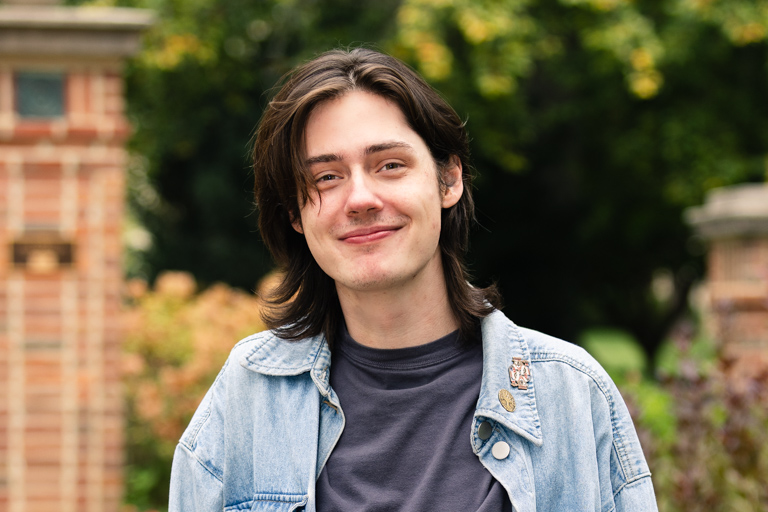Roanoke College senior visits South Korea on Critical Language Scholarship
October 15, 2025
Category: Scholarships & Fellowships

By Margo Boone '26
Damien Fellows ’26, an international relations major with Spanish and history minors, is back on campus after a once-in-a-lifetime trip to South Korea that was made possible by a competitive, national Critical Language Scholarship (CLS).
The Minnesota native was already learning Korean but wanted to become more proficient in the language. He also has ambitions to work abroad after college and has a fascination with language learning in general. Fellows was attracted to the CLS program after seeing a close friend win the scholarship for an immersive learning experience for Arabic. He applied after visiting the CLS website and finding that one of the 12 languages the program offered was Korean.
The CLS is a program funded by the U.S. government and implemented by the American Councils for International Education to give students critical language learning skills and intercultural awareness. It is designed to make them more competitive and aid in future career aspirations. The program is an immersive learning experience that packs one year of college language courses into eight to 10 weeks.
Fellows worked with Teresa Hancock–Parmer, Roanoke’s director of major scholarships and fellowships, to craft his application essays. Fellows was in the nation’s capital for Washington Semester at the time, and he said Hancock-Parmer was a great resource and support system for him.
“We met twice a week for meetings and revisions,” Fellows said. “She was just as invested as I was. She was very helpful.”
Fellows said he was nervous about the language barrier, but upon arrival in South Korea, he was assigned a language partner who helped him with his proficiency and served as a guide and friendly face during his time there. Students of the program are required to spend a minimum of three hours per week working with their language partner on conversational skills in their respective languages, and it is not uncommon for cohorts and language partners to become friends.
“My language partner and I quickly became friends, and we would go do miscellaneous activities together,” Fellows said. “He showed me around the city, which definitely helped me become more acquainted there. We would also go hang out in a big group including other cohort members and roommates, and sometimes language partners would tag along.”
“This experience is unparalleled. I think everybody who has an interest in language or using a language for their career later in life should really consider applying.”
Damien Fellows '26
Fellows had about four hours of classes per day and about two hours of homework, so he also had time to take a break and enjoy sightseeing and South Korean culture. Some of his favorite memories are filled with karaoke rooms, cohort excursions and a solo trip to Seoul. In the photo below, members of his cohort celebrate a birthday together.

Fellows encouraged students to apply if they want to make headway to learn a language.
“This experience is unparalleled,” said Fellows. “I think everybody who has an interest in language or using a language for their career later in life should really consider applying. Teresa Hancock–Parmer is a great resource!”
Fellows found his South Korea excursion to be relevant to his studies in international relations and history. He is currently in the process of applying for a Fulbright to South Korea and the Global Korean Scholarship (GKS).
Students who want to work abroad at the federal level after college should strongly consider CLS, as it could put them a step ahead of other job applicants. The program gives its participants non-competitive eligibility for federal jobs, which means program participants get to skip the queue for jobs they are considered and qualified for in the federal government.
“The Critical Language Scholarship gives students the opportunity to learn languages that are important in today's world but not taught at many colleges, through an immersive experience in a country where that language is spoken,” Hancock-Parmer said. “If a student is interested in Japanese, Chinese, Swahili, Arabic, Persian, Russian, Turkish, Hindi or others listed by CLS, I strongly encourage them to take a closer look at the website and get in touch with me. It is never too early to start strategizing about how to make your application as competitive as possible!”
The deadline for applications for the Critical Language Scholarship program is 8 p.m. Nov. 18, 2025. To learn more about the CLS program, visit clscholarship.org or the program’s YouTube channel for more information. Those interested in applying may contact Hancock–Parmer at hancock@roanoke.edu.